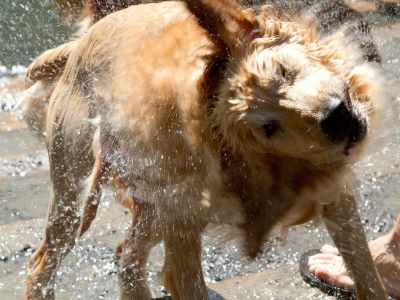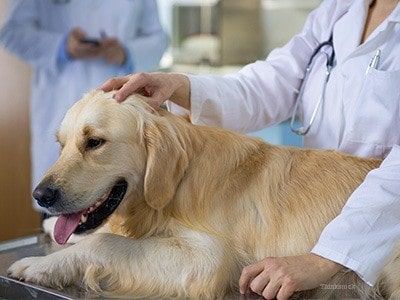It is easier to understand in humans, why we shake and tremble. It usually points to nervousness or sickness. But why do dogs shake? Are they nervous too? Or are they suffering from some ailment?

There are many reasons why your dog might shake and tremble. Reasons can be broadly categorized into: Psychological Reasons, Physiological Reasons and Stimulated by Environment. Let’s learn about it.
Key Takeaways
- There are many reasons for dog shaking, they can be excited or fearful. In this situation, you have to create a controlled environment and train your pet.
- Dogs like to shake off after a bath to dry their fur. This is common behavior with all animals with fur. Dogs also shiver when it’s cold, as a good pet parent you can cover them in blankets.
- If your dog is getting out of a swim, they may shake their head to get rid of water in their ears. If they continue to do this, contact a vet.
- As your pet gets older they can develop tremors in their legs. Overall examination is necessary to diagnose if it is something serious.
- Whenever you feel as though your pet is acting strange, it is best to take a trip to the vet.
1. Psychological Reasons
One of the most prominent reason for shaking is excitement. When younger pups are excited, their brains release adrenaline.

With pups having poor control over their neurological system, they start to release that energy by shaking. When a pup is under stress, the same hormone is secreted.
How you can help: Do not encourage their enthusiasm and fear, you should train them to be calm and to be able to respond to your commands. With fear, you can help the dog slowly get out of that state by providing regulated stimulation. To deal with hyperactivity, you can hire a professional trainer.
Anxious dogs[1] tend to shake as well. We advise consulting a vet.
“Learn to read dog body language so you can spot the first signs of stress, such as lip licking or pulled-back ears”, says Stephanie Gibeault from American Kennel Club. “Then, whether it’s walking in another direction or distracting your dog, you can act quickly to change the situation and relieve your dog’s discomfort.”
2. Stimulated by their Surrounding
You may have observed that after your dog has had a bath, they shake. Dog’s thick fur traps water, to get water off themselves they shake. This is a common behavior and nothing to worry about.

How you can help: Lay down a towel near the bathtub or wash area and let your pet shake off. Once the fur has partially dried, use a hair dryer set on low heat to finish drying it.
Dogs experience chilly shivers in winter much like humans do. They shiver involuntarily to aid in their warming process. Your dog’s muscles contract and relax in response to shivering, which helps them produce heat and increase body temperature[2].
How you can help: Cover them up, set your thermostat, and cuddle.
3. Physiological Reasons
After a swim or a bath, your dog may shake its head[3]. This is because water has risen in their ear. Dogs are prone to ear infections, so they shake their head when something is up their ear. It could also be nasal infection.

How you can help: If this continues for a prolonged period, it is recommended to consult a vet.
Like us humans, dogs too shiver when they’re sick. They could be feeling nauseous or they are in pain. There are many possibilities of what got them sick.
How you can help: Check if your pet has consumed something poisonous. This includes cigarette butts, caffeine, or even chocolate. If that is the case, you need to take your pup to the vet immediately.
Other reasons
As dogs get older, they usually get shivers on their legs. This is a sign of muscle weakness and could also indicate joint problems. There may also be signs of fatigue. This could also indicate underlying neurological or endocrinal disease.
How you can help: There needs to be a whole lifestyle change to sustain an old dog. As a pet parent, you need to ensure you are meeting their dietary needs. They need regular exercise and activities to keep their mind and body fit.
Generalized Tremor Disorder (GTS), also known as Shaker Syndrome, appears in young pups aged 2 to 7, but it can also manifests in old dogs. There are not enough studies on the cause of this syndrome.
How you can help: Be in constant touch with your pet. The medication used to treat this syndrome is prednisone. The aim of the medication is to provide less dosage and get maximum benefit while balancing side effects.
When to See A Vet?
There are multiple causes for dogs shaking. It could be in response to the environment or perhaps a sign of illness. When you see abnormal persistent behavior, it is important to seek a diagnosis from your veterinarian. Once you secure your diagnosis, you can better navigate the situation.

Follow the vet’s advice to the T. This is one of the many ways you can show love to your dog.
FAQs
Why does my dog shake when he’s not wet?
This is known as dry shake-off. Dogs do this when they’re stressed, bored, or drained from an interaction. It is a way of coping.
What can I give my dog for shaking?
There are various reasons for dog shaking. It is important to diagnose the condition before taking steps. Solutions range from calming the dog and covering them in a blanket to getting on medication.
Do dogs shake when in pain?
Tremors in specific body parts indicate muscle weakness and pain.
Do dogs shake when sad?
When dogs are upset they tend to shake. This shift in mood can be triggered due to their fear; for example, if a dog is afraid of thunder or fireworks, they may shake to cope.
Should I be worried if my dog is shaking?
Shaking itself alone is not worrisome. Observe other symptoms. If they show symptoms of diarrhea or vomiting, contact your vet.
Conclusion
Observing a different behavior in your pet can be worrisome. Be in touch with your vet and share your observations and what triggered that behavior. After arriving at a diagnosis, treatment is much easier.
We wish health to you and your pet.
References:
- Understanding, preventing, and treating dog anxiety. American Kennel Club.
- Heat-Related Illness in Dogs. (n.d.). Animal Health Topics / School of Veterinary Medicine. UC Davis.
- Why does my dog keep shaking his head? | Dallas Vet. New Hope Animal Hospital.



